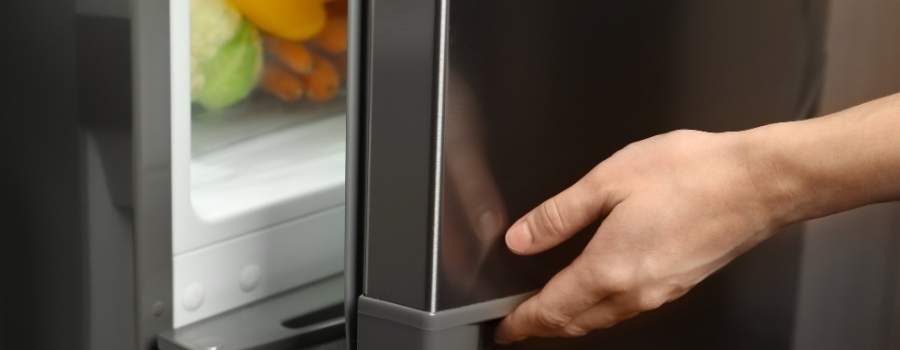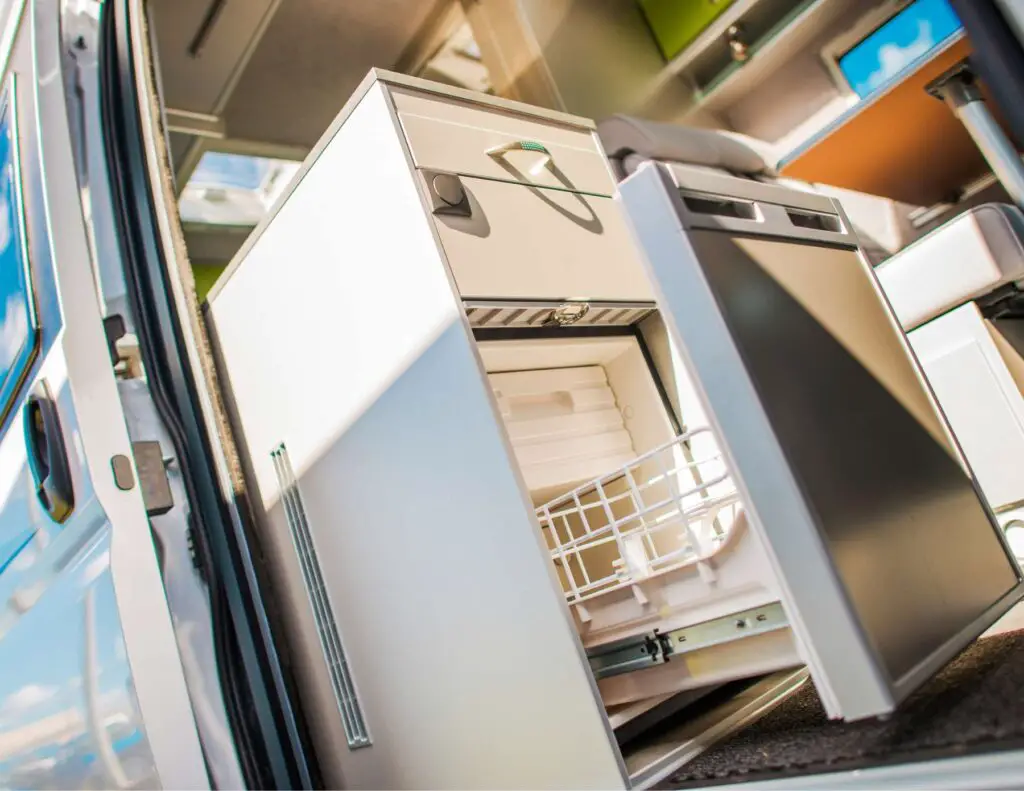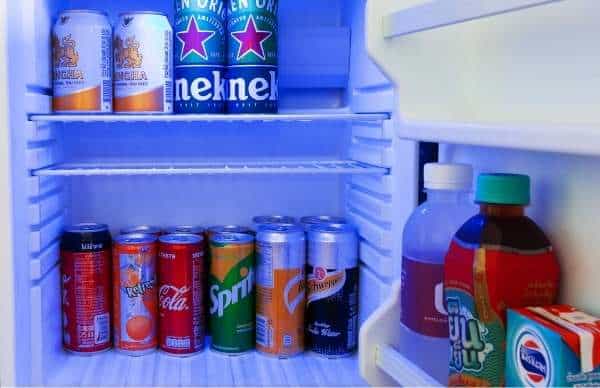
In today’s era of renewable energy, the question of can a refrigerator can run on solar power has gained significant interest.
With concerns about energy efficiency and environmental sustainability, many individuals are exploring alternative ways to power their appliances. This article delves into the feasibility and practicality of using solar power to operate a refrigerator, shedding light on the benefits, considerations, and potential challenges associated with this eco-friendly solution.
Whether you’re an environmentally conscious homeowner or an outdoor enthusiast seeking off-grid options, let’s examine the potential of harnessing the sun’s energy to keep your refrigerator running smoothly.
Key Takeaways
- Solar power can power a refrigerator, but it depends on the refrigerator’s size and the solar power system’s capacity.
- To determine the amount of solar power required to run a refrigerator, one must consider the refrigerator’s size, power consumption, and how long it needs to run.
- Solar power systems consist of several components, including solar panels, batteries, charge controllers, and inverters, and each component needs to be correctly sized to meet the refrigerator’s power needs.
Can A Refrigerator Run On Solar Power?
While solar power can run a refrigerator, it depends on the size of the fridge and the solar power system’s capacity. To determine the amount of solar power required to run a refrigerator, you must consider the refrigerator’s size, power consumption, and how long it needs to run.
Solar power systems consist of several components, including:
- Solar Panels
- Batteries
- Charge Controllers
- Inverters
Each of these component needs to be correctly sized to meet the refrigerator’s power needs.
Table of Contents
Is Using Solar Power To Run A Refrigerator Cost-Effective?
If you are just planning to power a refrigerator using solar then the cost to purchase and set up your array likely isn’t cost-effective. However, if you plan to run several appliances off this array, then the savings will add up over time and be worth your time and investment.
It’s true that setting up solar power has a significant upfront cost. Even if your state or county offers solar energy rebates and tax incentives, you still have to fork over the cash upfront.
Going back to the three major brands of refrigerators, you can see what the estimated yearly kilowatt usage is, but that yellow tag also tells you what your estimated yearly cost to power the fridge is. Now, this is an average (and probably skewed low) and many things can affect this. The big one that pops to mind is energy costs in your area.
If you are purchasing a new refrigerator that is highly energy-efficient, which most are nowadays, and you moderate your visits to get a chilled snack, then the price of the solar setup to run the fridge will be paid for in a few years. If you plan to run the fridge until it’s an antique and live in your home for many decades, then the money saved will be compounded each year!
Using Solar Power to Run a Refrigerator
When it comes to powering a refrigerator with solar energy, it is important to consider several factors to ensure that the system is efficient and effective. This section will cover the key considerations for solar powering a refrigerator, including estimating power needs, temperature considerations, and battery and inverter selection.
Estimating Power Needs
Estimating the power needs of your refrigerator can be done by determining the refrigerator’s power rating, which is typically measured in watts or kilowatts.
To estimate the daily energy consumption, multiply the power rating by the number of hours the refrigerator runs per day.
For example, if a refrigerator has a power rating of 100 watts and runs for 8 hours per day, its daily energy consumption would be 800 watt-hours (Wh) or 0.8 kilowatt-hours (kWh).
The power rating of a refrigerator is not constant and can vary depending on factors such as outside temperature, door openings, and the age and condition of the refrigerator. Therefore, it is recommended to add a buffer of 20-30% to the estimated power needs to account for these variations.
Temperature Considerations
In general, refrigerators operate most efficiently when the ambient temperature is between 60-80°F. For every 10°F increase in temperature above this range, the refrigerator’s energy consumption can increase by 5-10%.
Refrigerators operate by removing heat from the inside and expelling it to the outside. Therefore, it is important to consider the temperature of the surrounding environment when designing a solar power system for a refrigerator.
To ensure optimal performance, it is recommended to place the refrigerator in a cool, shaded area and to provide adequate ventilation for the compressor and condenser.
Battery and Inverter Selection
The battery should have a capacity that can provide enough power to run the refrigerator for at least 24 hours, and the inverter should be able to handle the surge power required by the compressor when it starts up.
It is also important to consider the efficiency of the solar power system, which can be affected by factors such as the solar panel efficiency, the battery bank, and the charge controller.
It’s recommended to use high-efficiency solar panels and a solar charge controller to ensure optimal performance.
Can A Solar Panel Run A Refrigerator?
One solar panel, all by itself wouldn’t be enough to run a power-hungry appliance like a refrigerator. You would need 2 to 4 panels to run the average household fridge in addition to other solar equipment such as batteries and converters.
Some of the factors that you should consider before running your homes fridge with solar power:
- Age of the refrigerator
- Style (Does it have an ice maker, in-door water, multiple freezer drawers, etc.)
- How many cubic feet is your fridge
- How many family members do you have and how many times a day will it be opened and for how long will it stay open
- Do you keep your fridge moderately full or is jam-packed with groceries
- Do you keep your house at a warmer temperature, forcing the fridge to kick on more often
And there are likely other factors that may be unique to your family or lifestyle that will apply here as well, but these are the major ones that most everyone should consider.
So, how do you figure out how power-hungry your refrigerator is on a daily basis? This requires a little math…don’t worry, it’s simple math so stick with me here.
The first thing you need to do is figure out how much power your refrigerator needs. If you’re currently shopping for a fridge then it will likely be on a big yellow sticker prominently featured somewhere on a display model. If you already have a fridge then it will either be labeled on the door or available from the manufacturer’s website.
- Find the Estimated Yearly Electricity Use (let’s say it says 500 kWh)
- Divide this number by 365 to get the daily amount. 500/365 = 1.37 kWh
- Divide this number by 24 (to get the hourly need.) 1.37/24 = .057 kWh
- Multiply by 1000 to convert to Watts. .057 x 1000 = 57 Watts/Hour
For further reference, here are the numbers for three of the top-rated, mid-sized refrigerators at the time of this writing.
| Samsung French Door Model #RF27T5241SR | 27 Cu Ft | 79 Watts/Hour |
| LG InstaView Model #LFCS27596S | 27 Cu Ft | 73 Watts/Hour |
| Frigidaire Side-by-Side Model #LFSS2612TF | 25.5 Cu Ft | 81 Watts/Hour |
So, we needed to get that information so that we could move on to figuring out how many solar panels you’ll need to run your homes fridge. To do this, we’ll use the Frigidaires stats since it had the highest yearly estimate of 709 kWh per year. We’ll also use a solar panel average production of 30kWh per month.
- Take 709 and divide it by 12 (getting the monthly average) = 59
- then divide 59 by 30 (solar panel output) to get 2 (I rounded)
That 2 means that to produce enough energy to run that Frigidaire on solar, you would need 2 panels to do so (each panel gets you to 30 kWh, so 2 gets you to 60 kWh.)
Then why did I say it would take 2-4 panels? I was accounting for older models that aren’t as energy-efficient as today’s models.
As I was writing this I was going through the Lowes website clicking on random refrigerators, some listed as Energy Star rating and some without and I was hard-pressed to find a fridge that had an average of over 750 kWh per year.
But this wasn’t the case a few years ago when this number would have been closer to 1000 to 1200 kWh per year, so I was allowing for people with older models that might be interested in using solar energy.
There is also the surge load (also called the starting load) to take into account. This is the initial power surge your refrigerator needs each time it starts up. The amount of power for the surge load is typically one and a half times the normal run load.
To figure this out, just multiply the watts by 1.5. So a 700-watt fridge has a surge load of 1050 Watts.
But this is great news for people in the market for a new fridge that they want to run on solar power. Now it takes fewer panels to run a fridge which means you can save money by running more appliances on solar, or save money by having to buy fewer solar panels. Win-win!
Refrigerator Power Ratings and Energy Consumption
The power rating of a refrigerator is measured in watts and indicates the amount of power the appliance consumes. This rating is typically found on the energy guide label that comes with the refrigerator.
The power rating of a refrigerator can be divided into two categories: running wattage and starting wattage. Running wattage is the amount of power the refrigerator uses to keep its contents cold, while starting wattage is the amount of power the refrigerator uses when it first turns on.
Energy Consumption of Refrigerators
The energy consumption of a refrigerator is the amount of energy it uses over a period of time. This is typically measured in kilowatt-hours (kWh) and can be found on the energy guide label. The energy consumption of a refrigerator varies depending on its size, age, and efficiency.
On average, a full-size refrigerator consumes between 1.5 kWh and 2 kWh of energy per day. This means that to run a full-size refrigerator on solar power, a solar array that produces around 1500-2000Wh of energy per day is needed.
Efficiency of Refrigerators
Energy-efficient refrigerators are designed to use less energy than older, less efficient models. One way to identify an energy-efficient refrigerator is to look for the Energy Star label.
Energy-efficient refrigerators use less energy to keep their contents cold, which means they are better suited for use with solar power.
When selecting a refrigerator for use with solar power, it is important to choose an energy-efficient model that uses less energy than older, less efficient models.
Components of a Solar Power System
When it comes to running a refrigerator on solar power, it’s important to have a basic understanding of the components that make up a solar power system. Here are the four main components:
- Solar Panels: Solar panels are the most important component of a solar power system. They are responsible for converting sunlight into electricity. The efficiency of solar panels is measured in terms of how much energy they can produce per square meter. The higher the efficiency, the more energy the solar panel can produce.
- Inverter: An inverter is a device that converts the DC power generated by the solar panels into AC power that can be used by your refrigerator. Inverters come in different sizes and capacities, so it’s important to choose one that is appropriate for your needs.
- Battery: A battery is used to store the energy generated by the solar panels. This energy can then be used when the sun isn’t shining. Batteries come in different sizes and capacities, and the size you choose will depend on how much energy you need to store.
- Charge Controller: A charge controller is used to regulate the amount of energy that is sent to the battery. It prevents the battery from overcharging or discharging too much, which can damage the battery. It also helps to ensure that the solar panels are working at maximum efficiency.

Off-Grid Refrigeration
When off the grid, solar-powered refrigerators or freezers are an excellent way to keep food and drinks fresh. These appliances run entirely on solar power and can be used without the reliance of standard grid-tied energy.
They may require an upfront investment, but they’ll save you money in the long run by reducing energy consumption.
When it comes to off-grid refrigeration, there are two main options:
- AC Refrigerators: AC Fridges are designed to run off 120v AC power
- DC Refrigerators: DC Fridges are designed to run off 12v or 24v DC power
When plugged into a solar power system (including solar panels, batteries, a charge controller, and an inverter), these refrigerators can be effectively used as off-grid fridges running off DC power generated by the solar system.
Pro Tip: In terms of power consumption, DC refrigerators are more energy-efficient than AC refrigerators making them more ideal for off-grid living.
It is important to note that the power rating of a refrigerator is measured in watts, and the energy consumption is measured in kilowatt-hours (kWh).
The power rating of a refrigerator determines how many watts it uses when running, while the energy consumption determines how much energy it uses over time.
To estimate the energy requirements of a solar-powered refrigerator, it is necessary to consider the power rating, duty cycle, and energy efficiency.
- Duty Cycle: The duty cycle refers to the percentage of time the compressor is running.
- Energy Efficiency: Refers to how efficiently the refrigerator converts electricity into cooling power.
The energy requirements can be calculated by multiplying the power rating by the duty cycle and then dividing by the energy efficiency.
When designing a solar power system for off-grid refrigeration, remember to consider the energy requirements of the refrigerator, as well as the available sunlight and battery capacity.
The solar panel array should be sized to provide enough power to run the refrigerator during peak sunlight hours, while the battery bank should be sized to provide enough energy to run the refrigerator during periods of low sunlight.

Can a Portable Fridge run on Solar Power?
It is possible to power a portable fridge with solar energy, making it a convenient and eco-friendly option for those on the go.
To power a portable fridge with solar energy, you will need a solar panel or a solar-powered generator. The size and wattage of the solar panel or generator will depend on the power requirements of your specific portable fridge.
When considering the practicality of running a portable fridge on solar power, there are a few factors to keep in mind:
- The efficiency of the solar panel or generator.
- Available sunlight in your location.
- Energy consumption of the fridge itself will all affect the performance and reliability of the system.
Frequently Asked Questions
How Many Solar Panels Does It Take to Run a Refrigerator?
On average, a standard refrigerator requires about three to four 300-watt solar panels to run efficiently. Factors such as the refrigerator’s wattage, the temperature you keep the fridge, and available sunlight can vary this estimate.
What Size Solar System Do I Need to Run a Fridge?
To run a standard fridge, a 500-watt solar system should give you enough power. However, the size of the solar system required depends on the fridge’s wattage, the number of hours it runs, and the amount of sunlight available in the area.
How Long Will a Solar Battery Run a Refrigerator?
A 100Ah battery can run a standard fridge for about 10-12 hours. The battery’s capacity, the fridge’s wattage, and the number of hours it runs will affect this time estimate.
How Many 100 Watt Solar Panels Does It Take to Run a Refrigerator?
On average, a standard refrigerator requires about three to four 300-watt solar panels to run efficiently. Therefore, it would take about nine to twelve 100-watt solar panels to run a fridge.
Can I Run a 12v Fridge Off a Solar Panel?
You can run a 12v fridge off a solar panel however, you need to ensure that the solar panel’s output voltage matches the fridge’s voltage requirements. Additionally, you need to ensure that the solar panel produces enough energy to power the fridge.

